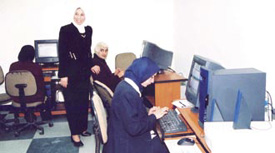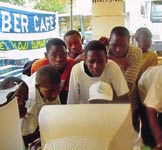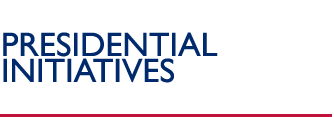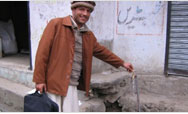 |
Digital Freedom Initiative

As described on its website (www.dfi.gov), the Digital Freedom Initiative (DFI) was announced at the White House on March 4, 2003. DFI is part of the Volunteers for Prosperity initiative (www.vfp.gov). The goal of DFI is to promote economic growth by transferring the benefits of information and communication technology to entrepreneurs and small businesses in the developing world. The approach is bold and innovative, leveraging the leadership of the U.S. Government, the creativity and resources of America's leading companies, and the vision and energy of entrepreneurs throughout the developing world. DFI was piloted in Senegal in 2003. Peru, Indonesia, and Jordan are the newest DFI partner countries.
- In Indonesia, volunteers from companies and NGOs stepped forward to become part of an informal alliance to work toward improved legislation combating cybercrime and a better, more transparent operating environment. While these companies and NGOs had their own interests at stake, it showed that cybercrime affects all of Indonesian society and is truly a global problem.
- In Indonesia, increased awareness has now brought small and medium-sized enterprises to understand the need for cybersecurity. In addition, the Government of Indonesia is drafting improved legislation and considering ratification of the Convention on Cyber-crime.
- DFI/Senegal identified and developed a variety of information and communication technology-enabled training materials, which have been used to help improve cybercafe operations, business management, and market access for dozens of Senegalese small and medium-sized enterprises. DFI/Senegal is now working to leverage its investment in these materials to have them used country-wide.

Combating Cybercrime and Helping Small Businesses
Indonesia has one of the highest rates of cybercrime in the world. This puts a drain on the economy. For example, businesses cannot conduct e-commerce for fear of cybercrime. Major international credit card companies add a surcharge on transactions in Indonesia because of the high rate of pirated card numbers. Under the DFI/Indonesia program, USAID, the U.S. departments of State and Justice, and the Association of South East Asian Nations (ASEAN) Secretariat supported the hiring of a cybersecurity czar in Jakarta for one year to assist the Government of Indonesia, the private sector, and NGOs to enhance their skills in the area of safe business and sound legislative practices.
Partnering with a local merchant association and using equipment partially donated by the government, DFI/Senegal sponsored the creation of the "Cyber Louma," an Internet access center in Dakar's Sandaga Market, to pilot uses of information and communication technology with small and medium-sized enterprises to improve their market access and upgrade business skills. DFI volunteers provide help with business strategy and training content. The Cyber Louma has already helped over a dozen small merchants.
- Souhaibou Diop, a small merchant, usually buys his goods from suppliers in Dubai. One day he heard about the Cyber Louma, so he dropped in to see what it was all about. After being trained and setting up an e-mail account, he began searching for new suppliers and soon established an electronic relationship with Magna Fabrics of New Jersey. He now buys his fabrics through this relationship, deepening Senegal's trade with the United States.
- Gor Mbaye is a small wholesaler in Sandaga Market. He owns a store and does business with many suppliers in Dakar. He used to write his bills by hand and never knew much about computers. Following training at the Cyber Louma, Gor Mbaye does all his bills and accounting with a computer. He e-mails suppliers, receives offers, and negotiates prices. Now he is taking more advanced accounting courses at the Cyber Louma.
- Investing in top U.S. expertise in the field of cybersecurity increased the willingness of Indonesian businesses and government agencies to
- learn together about cybersecurity
- jointly develop solutions that fit Indonesia
- see the value of international cooperation in dealing with this global problem
- It is especially useful for programs such as DFI to engage global and U.S. businesses already present in the country to provide volunteer support, as well as tap local business training institutes, where students benefit from participating in DFI on a volunteer basis. (DFI/Peru)
- Information and communication technology-enabled applications developed in one DFI country can be adapted for use in other countries. (DFI/Senegal)
- As DFI/Senegal's program matures, the team is becoming more effective at working with local volunteers to apply their knowledge of the local business environment, while helping U.S. volunteers better apply their American business expertise.
Note: Results for this initiative were reported through USAID's consolidated reporting system
Back to Top ^
|


